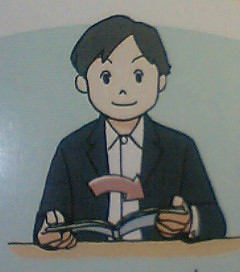But I also have not been sleeping so much each night. For the last couple weeks I've been averaging about 4.5~5 hours of sleep most weeknights, with a 20 minute nap around mid-afternoon. Is it good for me? Depends on what you mean. Since I have to eat the school lunches every day, I'm probably getting a better diet in terms of nutrition than I've had since I left home. So I'm not so concerned about getting sick. And apart from the odd sports festival, my job is not so physically demanding. The problem is that it's not always so mentally demanding either.
Sometimes it's a struggle to stay focused on the job when it's just a matter of waiting to see what example sentence you'll be asked to repeat next. And since a huge part of my job is providing vocal models and then waiting for the head teacher to shout "repeat" at the kids, I have rather a lot of waiting to do. In an average 45 minute class I might spend 6 or 7 minutes enunciating and the rest of the time trying to keep the kids on the same page. Like, actually clarifying the teacher's Japanese instructions to turn to page 18.
Seriously, the teacher will say, in these kids' native language: "open your textbooks to page 18." It's not in English or German or pig latin, and he doesn't use some ceremonial, anachronistic sentence structures.
"Pray, openne thy volumes of the tongues of the islande kingdom of Albion, and allow thy gaze to rest uponne the leaf numbered with the eighteenth ordinal indicating the place in sequence."
 But for some reason, there will always be five or six students blinking dimly around at their peers, trying in vain to understand the meaning of "textbook." It didn't seem to me that a visual aid for something like that would be needed, but sure enough, not only do I have to demonstrate opening the book, there's actually a diagram of how to do it in their textbook.
But for some reason, there will always be five or six students blinking dimly around at their peers, trying in vain to understand the meaning of "textbook." It didn't seem to me that a visual aid for something like that would be needed, but sure enough, not only do I have to demonstrate opening the book, there's actually a diagram of how to do it in their textbook.But the relative dimness of some kids isn't the tangent I wanted to lead you on. My point is that after three years, I've become pretty familiar with my job, and it doesn't always keep me interested. But being really tired makes it a lot easier. If my mind is only running at, say, 60% capacity, it becomes much harder to get lost in a really interesting thought. Mainly because it's a lot harder to think of anything really interesting when I'm that tired.
But last night I got a full 6 hours of sleep. It's like someone turned up the power on all the inputs: colors are sharper and have more contrast, I can hear and discern more sounds, my mosquito bites are itchier and I can feel the difference between the cotton of my t-shirt and the cotton of the shirt I've got on over it where it changes on my upper arm. Smells, tastes, the whole shebang. And it has been a trial keeping on task in class. When one student starts drifting off, it's obvious from his body language. When another stops taking notes and starts writing letters to her friends, I can hear the difference in the speed and rhythm of the scratching sounds her pen makes. And even while all this is going on, underneath it my train of thought has turned into a freaking subway system. It's easy to get lost in all of that, and miss the cue to repeat the dialogue for the sixth time that day. Or was it the seventh?
Which is why I guess I've sort of been handicapping myself. In order to make sure I'm applying myself to the mundane stuff, I've been preventing my mind from being able to wander so effectively or so far out of the bounds of work...
Wait. Did I just admit to sabotaging myself in order to be able to work more efficiently?

1 comment:
damn, that was some good Vonnegut...and yes, independant thought in the classroom won't get the drills done. If I think too much about it, I don't sound like a native speaker...that in of itself is a peculiar experience.
Post a Comment